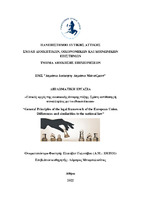| dc.contributor.advisor | Μπαμπαλιούτας, Λάμπρος | |
| dc.contributor.author | Γκλινάβου, Ελισάβετ | |
| dc.date.accessioned | 2022-11-30T10:24:39Z | |
| dc.date.available | 2022-11-30T10:24:39Z | |
| dc.date.issued | 2022-05-17 | |
| dc.identifier.uri | https://polynoe.lib.uniwa.gr/xmlui/handle/11400/3423 | |
| dc.identifier.uri | http://dx.doi.org/10.26265/polynoe-3263 | |
| dc.description.abstract | Στην παρούσα εργασία εξετάζεται οι γενικές αρχές από τις οποίες διέπεται τόσο το ευρωπαϊκό όσο και το εθνικό δίκαιο. Στην αρχή της εργασίας γίνεται μία ιστορική αναδρομή στην έννομη τάξη της ΕΕ, ξεκινώντας από τη Συνθήκη του Μάαστριχτ (1992) καταλήγοντας στο σήμερα και συγκεκριμένα στη Συνθήκη της Λισαβόνας (2009). Η τελευταία αυτή Συνθήκη διαχωρίζεται σε 2 επιμέρους Συνθήκες, την Συνθήκη για την Ευρωπαϊκή Ένωση (ΣΕΕ) και την Συνθήκη για τη λειτουργία την Ευρωπαϊκής Ένωσης (ΣΛΕΕ). Οι δύο συνθήκες με τη σειρά τους ρυθμίζουν την έννομη τάξη της ΕΕ καθώς δεν υπάρχει κάποιο Ευρωπαϊκό Σύνταγμα, όπως στην Ελλάδα. Επειδή λοιπόν η ΕΕ δεν έχει ούτε Σύνταγμα ούτε νόμους (τον αντίστοιχο τυπικό νόμο πχ) αλλά εκδίδει κανονισμούς, οδηγίες, αποφάσεις κλπ. θα μπορούσαμε να πούμε ότι οι γενικές αρχές που διέπουν όλα τα κράτη μέλη της ΕΕ δεν θα πρέπει να παραβιάζονται αλλά να τηρούνται σύμφωνα με τις συνθήκες. Στη συνέχεια, θα γίνει εκτενής αναφορά στη συνέχεια, αναλύοντας τις κυριότερες αρχές και αναφέροντας τις επιμέρους αρχές που συναντάμε στις Συνθήκες. Στη συνέχεια, θα εξεταστεί το ισχύον Σύνταγμα της Ελλάδας και συγκεκριμένα ποιες αρχές είναι ίδιες και ποιες δεν αναφέρονται καθόλου στο κείμενο του νόμου. Θα αναφερθούν και οι αρχές που διέπουν το διοικητικό δίκαιο, καθώς το νεότερο διοικητικό δίκαιο, διέπεται από ορισμένες γενικές αρχές, γεγονός που προκύπτει από τη νομολογία, και ιδίως του ΣτΕ. Κλείνοντας, θα γίνει μια αναφορά για το πώς επηρεάζουν την άσκηση της δημόσιας διοίκησης οι ενωσιακές αρχές. | el |
| dc.format.extent | 101 | el |
| dc.language.iso | el | el |
| dc.publisher | Πανεπιστήμιο Δυτικής Αττικής | el |
| dc.rights | Αναφορά Δημιουργού - Μη Εμπορική Χρήση - Παρόμοια Διανομή 4.0 Διεθνές | * |
| dc.rights.uri | https://creativecommons.org/licenses/by-nc-sa/4.0/deed.el | * |
| dc.subject | Ενωσιακή έννομη τάξη | el |
| dc.subject | Συνθήκη του Μάαστριχτ | el |
| dc.subject | Συνθήκη της Λισσαβώνας | el |
| dc.subject | Σύνταγμα | el |
| dc.subject | Νομολογία ΣτΕ | el |
| dc.subject | Διοικητικό δίκαιο | el |
| dc.subject | Δημόσια διοίκηση | el |
| dc.subject | ΣΕΕ | el |
| dc.subject | ΣΛΕΕ | el |
| dc.title | Γενικές αρχές της ενωσιακής έννομης τάξης. Σχέση αντίθεσης ή συναλληλίας με το εθνικό δίκαιο | el |
| dc.title.alternative | General principles of the legal framework of the European Union. Differences and similarities to the national law | el |
| dc.type | Μεταπτυχιακή διπλωματική εργασία | el |
| dc.contributor.committee | Στράνης, Δημήτριος | |
| dc.contributor.committee | Τζέμος, Βασίλειος | |
| dc.contributor.faculty | Σχολή Διοικητικών, Οικονομικών & Κοινωνικών Επιστημών | el |
| dc.contributor.department | Τμήμα Διοίκησης Επιχειρήσεων | el |
| dc.contributor.master | Δημόσια Διοίκηση – Δημόσιο Μάνατζμεντ | el |
| dc.description.abstracttranslated | This paper examines the general principles governing both European and National Law. First, the paper presents a historic overview of the European Union’s legal framework from the Maastricht Treaty in 1992 through today, and in particular, the Treaty of Lisbon, signed in 2009. The Lisbon Treaty is divided into two sub-treaties: the Treaty for the European Union and the Treaty for the Functioning of the European Union. In the absence of a European Constitution (unlike the case of Greece), the two treaties regulate the legal order of the EU. Because the EU has neither a constitution nor laws, but only issues regulations, decisions and directives, we could argue that the general principles governing all Member States of the EU should not be violated and should be abided by, according to the signed treaties. Moreover, an in-depth analysis will take place below, analyzing the main principles and mentioning the side principles of the Treaties. Following this analysis, the current Constitution of Greece will be examined, and more specifically, which principles are the same and which are not mentioned at all. The principles governing administrative law will also be mentioned; as the newest administrative law is governed by certain general principles, a fact that derives from the legal framework, mainly as set by the Council of State. This paper will conclude by discussing how the EU principles impact the practice of public administration. | el |


